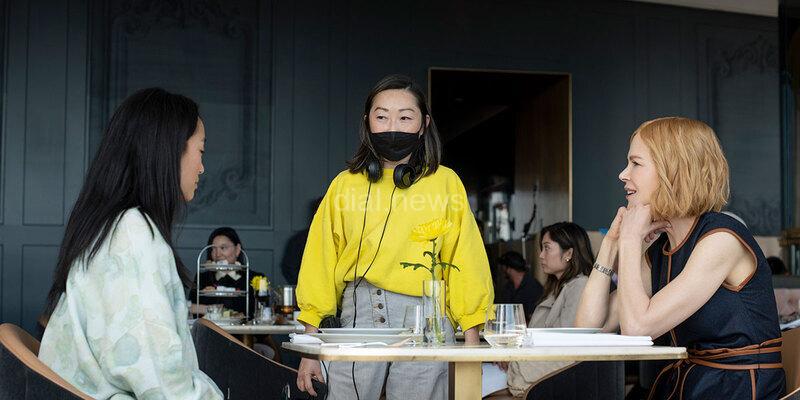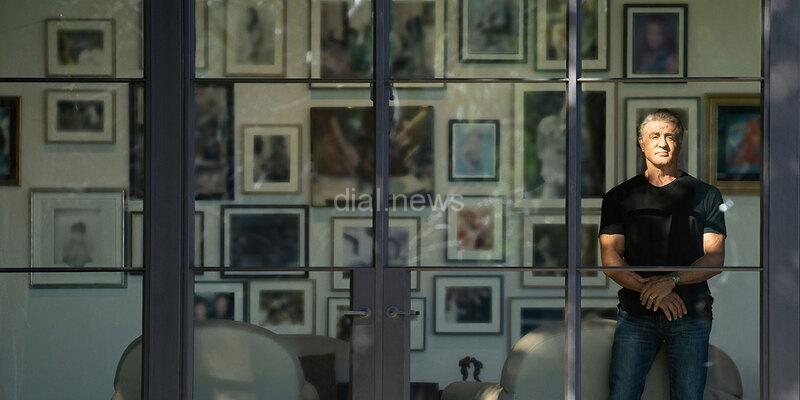[ad_1]

Three projects I watched at the festival this year asked audiences to think about subjects that they think they know well and look at them from a different angle. In the first two episodes of the new romantic series “Alice & Jack,” from writer Victor Levin and director Juho Kuosmanen, a complex relationship unfolds over its first two years as it pushes against morally gray boundaries. In the penultimate episode of Lulu Wang’s new limited series “Expats,” the writer-director gives us a glimpse into the world of working class expats in Hong Kong. Finally, Thom Zimny’s documentary “Sly,” presents not just Sylvester Stallone the action star, but Sylvester Stallone the writer-director-producer-actor-artist-auteur.
Two figures sit in a field, the proximity of their bodies indicates a deep intimacy. In the voiceover we hear “Love is the best thing we have, maybe after we strip away all of the bullshit, it’s the only thing we have.” Finally, the camera rests on the figures. It’s Alice (Andrea Riseborough) and Jack (Domhnall Gleeson). Alice gives Jack a gentle kiss, then walks away, looking back only to give a “goodbye” style glance. Jack remains still, defeated.
Cut to on-screen text telling us it’s “Two Years Earlier.” Based on the cellphones used, it’s in the mid-2000s and Alice and Jack have just met at a bar after connecting on a dating app. Alice, who works in finance, is blunt and a little aggressive. Jack, a medical researcher, is a little shy and nervous. Their chemistry is immediately apparent. Director Juho Kuosmanen films these scenes with a series of close-ups, as if Alice and Jack are the only two people in the world, while Victor Levin’s script supplies them plenty of witty banter.
As the two episodes progress, we see how these two opposites fall in love fast and break-up equally as quick. Then, how a heartbroken Jack finds solace with Lynn (Aisling Bea, never better), a fellow Irish person living in London. They don’t have the same chemistry, but they have a shared Irishness that pulls them together. Just as Jack has accepted his steady life with Lynn, Alice comes crashing back into it with a force all three are not prepared for.
As each character does unthinkable things, Levin’s script slowly reveals emotional layers that color why they might make such decisions, asking viewers to examine the thornier sides of life in situations they normally write off as simply bad behavior. In that sense, while “Alice & Jack” is very much a swoony romance (complete with an overbearing score that could be scaled back a bit), it’s more honest about human behavior than most romances allow.

Lulu Wang’s new limited series “Expats,” an adaptation of Janice Y.K. Lee’s novel The Expatriates, mainly focuses on the trials and tribulations of wealthy Americans Margaret (Nicole Kidman) and Clarke (Brian Tee) after they move to Hong Kong with their three kids, make friends with fellow expats like Hilary (Sarayu Blue) and her husband David (Jack Huston), and weather a family tragedy. “Central,” the 96-minute episode Wang presented at the festival, takes a different approach to the story. Wang herself called this episode “an alternate door” into the world of the show.
Set over the course of one rain-soaked day, the episode follows the intersecting lives of two Filipina migrant workers Puri (Amelyn Pardenilla) and Essie (Ruby Ruiz) who work as domestics for Margaret and Hilary, as well as several other characters whose lives in Hong Kong intersect in complex ways, with each other and with the show’s main characters.
Under a bridge a group of women hide from the torrential rain while singing Katy Perry’s “Roar.” Soloist Puri is an immediate standout. Among the other characters we follow throughout the episode, it’s her whose emotional world becomes the clearest. We follow her from rehearsal to a gossip session with other women who work as domestics, to sending money back to family in the Philippines, and finally spending a drunken night with her boss Hilary in the wake of a fight with her husband.
When chatting with the other women, Puri says that Hilary is not just her boss, she’s her friend. The ladies all laugh at her naivete. From the moment she’s back in her employer’s apartment, we see the real situation. Hilary uses Puri as an emotional weapon in her fight with her husband. Later, after several bottles of wine, she promises to lend Puri her fancy dress to wear at a singing competition, only the next day to treat her like a servant once again.
There are glimpses in this episode of the titular expats, especially Kidman’s Margaret and Blue’s Hilary, but the time spent with these background characters, especially Puri and Essie is rendered with such warmth and their lives so rich and layered, it made me wish the whole series were just about them. The glimpses we get of Margaret and Hilary’s more privileged lives, even if stained with tragedy, made me question why the rest of the series focuses on them. What about their lives hasn’t already been seen on screen in one iteration or another? And why we can’t have a grand limited series about someone like Puri, whose life is more interesting and far more relatable? If this is “an alternate door,” hopefully the main door treats these characters with as much grace as this episode does, they surely deserve it.

Lastly, as with his many collaborations with Bruce Springsteen, Thom Zimny’s documentary “Sly” explores the vast artistic and emotional life of Sylvester Stallone. As someone who has always been a huge fan of Stallone, especially of the “Rocky” franchise and particularly the way he has kept the emotional truth of that character so richly alive for nearly fifty years, I found this portrait of an artist incredibly rewarding.
The impressionistic doc is bookended by Stallone packing up his home, filled with memorabilia from all his films, including many Rocky statues. He’s heading back East, where he was born, after decades of living in Los Angeles, because he doesn’t like to get complacent. Off-screen he’s asked if he has regrets. “Hell yeah I have regrets,” he states with conviction. Charming and direct, Stallone speaks in deceptively simple aphorisms, his hard-earned wisdom couched in fortune-cookie style phrases.
As he packs up his home, he tells the story of his life while looking through objects that contain his emotional autobiography. Stories of his parents’ tumultuous marriage, and especially of his father’s abuse, act as a through-line to the empathetic worldview he brought to franchises like “Rocky” and “Rambo,” even as he equally expresses himself in them through controlled violence. Along with these early memories, Stallone shares his creative process. Like the way he honed his creative voice by recording the audio of movies while working as an usher then coming home and trying to rewrite the dialogue in his own words.
Although he’s mainly remembered now as a monosyllabic action hero, the doc reminds us of his artistic origins. Not only did he conceive of “Rocky,” and wrote the final script for “First Blood,” he also worked as any combo of writer, director, and producer for over two dozen films in which he starred. And while his preferred mode of cinema is the action genre, like the sword and sandal epics and westerns on which he grew up, it’s through these films he’s been able to exorcise the demons from his past, to share his emotional truths, and create a cinematic world based in hope.
Just when you think the doc edges too far into hagiography, Stallone cuts his own self-image down to size. He critiques his artistic choices, his personal failures, and even his own ego. In my favorite scene of the doc, he listens back to an old-recorded interview, in which his younger self calls “Rocky” a character study. He yells to that younger version of himself, “It’s a love story! Say it!,” admitting that back then he couldn’t say something like that out loud. If young Stallone was hungry for artistic expression and fame, old man Stallone knows that in the end, it’s love that matters most.
[ad_2]

